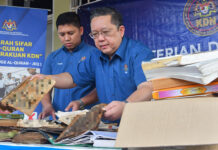SINGAPORE (CNA) – Wesley Loh, an advocate for autism, encounters difficulties when presented with unclear instructions or conversations infused with sarcasm.
Recalling his military experience, Loh shared a moment when he received contradictory messages like, “Take your time, take your time,” creating confusion and frustration due to the underlying intention.
But he acknowledges that his autism gives him a sharp eye for detail, and it means he thrives under structure and predictability. These strengths have served him well in his job within the tax industry, he added.
Loh shared these insights as one of six guests on the podcast series about neurodiversity in the workplace.
In addition to individuals with autism, those with attention deficit hyperactivity disorder (ADHD) and dyslexia, among other neurological differences, are also considered neurodivergent.
But despite the growing awareness and acceptance of neurodiversity, guests agreed that more can be done to effectively help these individuals at work – including those with lower support needs.
Besides Loh, other guests who have autism, ADHD and dyslexia, including bosses and job coaches, also shared tips on how workplaces can provide support, as well as strategies for such employees to thrive in their roles.


MANAGING, WORKING WITH NEURODIVERGENT COLLEAGUES
Here are five tips for those who work with or manage neurodivergent employees:
Give clear instructions
While this might be extra helpful to autistic employees, everyone ultimately stands to benefit from clearer instructions, said Loh. He pointed out that “what makes sense to a non-autistic may not make sense to an autistic”.
“Be explicit rather than implicit – and avoid idioms and sarcasm because autistics may not catch them. So don’t say ‘raining cats and dogs’, just say, ‘it is raining heavily’”, he said.
Many autistic people are “very literal”, and this also affects how they communicate with others. Occasionally, they might unintentionally offend others, Loh added.
“If the same thing is said by a non-autistic, it can actually mean a very different thing simply because autistics often do not have hidden meaning behind their words.”
When in doubt, he advised: “Clarify what an autistic meant, instead of assuming what he meant and taking offence.”
Don’t be afraid to ask
Diagnosed with dyslexia when she was in primary school, Chan Pui Yan now holds a job that involves a heavy amount of writing and reading of policies.
The artificial-intelligence (AI) ethicist was once approached by two curious colleagues who wanted to know more about her dyslexia – and more importantly, how she wrote her company’s AI policy and other guidance documents.
Create a safe environment
Similarly at local cybersecurity firm, Ensign InfoSecurity, its chief information officer Steven Ng believes a company’s employees ultimately create a culture of psychological safety that allows neurodivergent individuals to be themselves.
The firm, which started a pilot programme two years ago to hire autistic individuals, took a “phased approach” to the onboarding process, providing them a smooth transition into the job.
“They were given time to fit into their roles over several months. It allowed them to really express their strengths, as opposed to what they couldn’t do,” he shared.
Practise flexibility
Psychological safety should start at the hiring process, according to career coach Dawn Foo, who has worked with neurodivergent clients.
Foo, who was diagnosed with ADHD in her 40s, urges companies to reconsider the “age-old hiring format” where a candidate has to face a panel of interviewers. While there is “nothing primarily wrong” with that format, it should fit the function of the job, said Foo.
“Unless the person is required to be in a customer service or customer-facing role and you expect them to pick up certain cues, like non-verbal, please don’t put them through that,” she said.
Meanwhile, Ng, whose firm tailors job scopes to autistic employees that it hires under its programme, acknowledged that these employees are assessed on a “different metric” from their neurotypical peers.
But they are still assessed on their performance “in the same way as any neurotypical individual”.
Prioritise maximising strengths over fixing weaknesses
Having teammates whose skills complement the neurodivergent employee’s helps everyone, said career coach Foo.
She highlighted that, for example, combing through data isn’t her strong suit as it requires attention to detail, which ADHD individuals aren’t typically good with. But she would willingly take the lead in a team presentation that allows her to tap into her creativity.
“I would love to focus on something, which is really my core competence and just hone in on those skills,” she added.
As the leader of the sustainability risk advisory practice at a consulting firm, Yvonne Zhang “instinctively” knows that her team should lean on each other to “maximise their strengths, not to fix their shortcomings”.
ADVICE FOR NEURODIVERGENT EMPLOYEES
Here are five tips for neurodivergent employees to thrive in the workplace:
Develop strategies that work for you
As not everyone experiences symptoms with the same severity, AI ethicist Chan shared her best advice: “Understand your dyslexia, your ADHD, for what it is (and) for you how you experience it.”
She copes with her dyslexia, for example, by using “a lot of colour” when she drafts reports. As for her ADHD, she often needs an outlet for her thoughts.
“I will write notes to myself – that helps with the ADHD, getting everything out of my head and onto a piece of paper so the ideas can then become organised,” she said.
Legal manager Amrun Hisyam similarly uses his email drafts to pen down his thoughts: “I will open a new email message and… I will type in whatever it is, and I just leave it there.
So at any point in time, I have like 10 drafts open, but that’s because that’s how I remember things.”
His colleague, who like him has ADHD, places many post-it notes on her table instead to help with her memory.
Amrun works at Crescent Law Chambers, where almost everyone including the managing director, has ADHD. He stressed the importance of using a calendar to keep track of deadlines. If an appointment isn’t in the calendar, it doesn’t exist in their minds.
Still, there are occasional hiccups. “The problem is remembering to put it in your calendar,” he admitted.
Find your “why”
Beyond daily hacks and coping strategies, career coach Foo pointed out that “personal values are a big thing” for neurodivergent individuals, because “we want to do work that we want to make money and make meaning at the same time”.
But “we have got to be practical”, she said. “What are the prospects out there really telling us in terms of the market?”
While “lacking purpose is a big hindrance” for Zhang, the leader in a consulting firm, she cautioned that not every task or role will meet your purpose. Nonetheless, employees with ADHD, in particular, often need to know the deeper meaning behind tasks to do them.
According to Amrun: “If I don’t know the ‘why’, I just don’t want to do it. I hate doing something just because. I need the reason why.”
Accept your differences
Chan, who has ADHD and dyslexia, used to feel ashamed that she struggled with reading and writing. This only changed when she stopped beating herself up for her challenges.
“One of the best things I did for myself was when I stopped treating reading as a skill that I could master with more practice.
“When I stopped seeing it that way, I saw it as wearing glasses – I wouldn’t tell myself that I just need to squint harder. That’s not useful at all,” she said.
“That’s when I realised it’s okay to be different and it’s okay to do things in a way that works for you.”
Be upfront about your needs
Once neurodivergent employees embrace their differences, it becomes easier to speak up about what they need, said those who have advocated for themselves at work.
Foo recalled clients who have told her that they don’t want to lead people or manage a team. They know that they’re good at what they do and want to stay in that zone, she noted.
“And that’s fine. If we can be upfront about it, I think that would make it a lot more optimal in terms of allocation of resources as well,” she said.
Meanwhile, Loh, who is autistic, said he’s not afraid to ask for clearer or more detailed instructions. But he admitted that some people “still maintain their own style of communication without adjusting to me”.
In such cases, “unfortunately, the only way to get by is to put in more effort to learn their style of communication and infer what they are saying”, he added.
“If they’re not explicit enough, I’ll just ask them some more.”
Share your diagnosis with context
Finally, for those considering to disclose their diagnosis, Foo stressed that it’s not helpful to “share it in a vacuum”.
She pointed to employees who may simply tell their manager that they have neurological difference and expect their manager to know what to do with the information.
When managers don’t understand how to help, such conversations could end up “amplifying their ignorance”, she noted.



















































